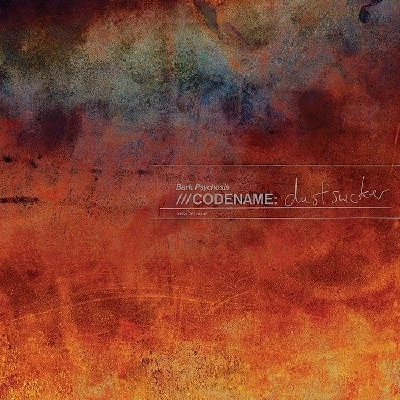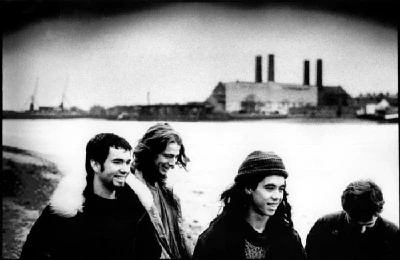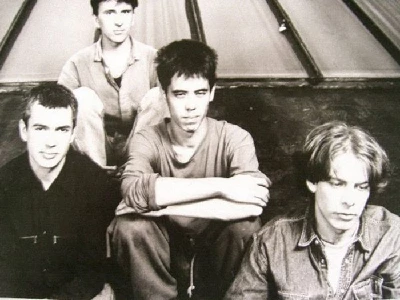published: 10 /
5 /
2018

Adrian Janes reflects on the reissue of 'Codename; Dustsucker', the astonishing 2004 second and final album from British band Bark Psychosis, finding that, while its blend of musical moods and random sounds might be defined as post-rock, it in fact, however, transcends all categories.
Article
Bark Psychosis were formed in 1986 by music-obsessed teenagers Graham Sutton and John Ling. Meeting with drummer and community worker Mark Simnett gave them access both to a room at St. John ‘s church in Stratford, East London and to their own developing musical imaginations (fed by influences as diverse as Swans, David Sylvian, Psychic TV and Talk Talk, whose drummer Lee Harris contributes to ‘Dustsucker’). Over a span of years this led to a number of EPs and two albums: ‘Hex’ (1994), which was re-released last year, and now the second, ‘Codename: Dustsucker’, originally released in 2004, the name deriving from Sutton’s studio (he has become a noted producer of artists like British Sea Power and Jarvis Cocker).
‘From What is Said to When It’s Read’ opens the album with slow, sobre strummed guitar and a sombre drum stroke. The mood is lightened by dreamy wah-wah, prettily chiming guitar and delicious harmonies that seem less sung than simply breathed. But just when you have been lulled into a state of peaceful rapture this drifts away, replaced by electronic beeps, before an immense slab of noise all but overlays the original music, like a jet plane landing in a lounge.
This startling mixture of sounds and instruments proves characteristic, except that it’s this very ability to surprise which means the chief characteristic is that there is no typical sound. While ‘The Black Meat’ is mainly jazz-inflected with electric piano, organ, skittering drums and cupped trumpet, random unsettling sounds in the mix contradict the dominant mood, with further shifts into a melodica line which irresistibly brings Augustus Pablo to mind, before a fade-out over sustained synth chords.
Some of the songs might almost be called suites, in their movement though several moods in the course of a single track. ‘Shapeshifting’ is the peak of this approach as well as a title that could have aptly stood for the whole album.
Beginning from a strong, steady drum pattern, rich organ chords and acoustic guitar support a wistful female voice, the evocation of My Bloody Valentine made all the stronger with an added layer of forceful electric guitar and then an astonishing break, like a guitar duel between Kevin Shields and Jimi Hendrix attempting to play the same instrument. This in turn is replaced by waves of choral voices, as in New Order’s ‘The Beach’, another shift in mood to conclude.
Bark Psychosis' world ebbs between extreme poles, between and within songs. (A song on one of their EPs, ‘Pendulum’, specifically relates to Sutton’s mood swings.) Whereas something like the caressed vibes of ‘400 Winters’ makes for a largely beatific atmosphere, ‘Miss Abuse’ has a much more sinister air; Sutton’s voice, light and breathy elsewhere now deep, treated and echoing balefully. The intricate music of other tracks is stripped down to what sounds like a repetitive tapping of piano strings and a sporadic grinding bass. Yet it’s somehow compelling, and after the grimly delivered line “You’d better act your age” a snarling synth phrase comes to the fore, lifting the tension still higher against a rising keyboard.
‘Burning the City’ is perhaps the nearest thing to a love song here, curious lyrics “About that birdgirl who ran to sea/She took off from the rooftops/And landed next to me” in a beautiful setting of piano, acoustic guitar, brushed drums and tinkling vibes. But nothing in this world is ever that uncomplicated, and the music becomes mixed with a confused spiralling sound and wrenching guitar, which continues to intrude even as touches of flute introduce some calm at the close.
The title ‘INQB8TR’ might have something to do with the length of time the whole of ‘Dustsucker’ needed to be cultured into existence (it was recorded between 1999 and 2004). As so often, it’s more complicated to fully analyse the elements than simply to accept the flow and the abrupt changes of the music, from its ominous opening, like something immense approaching through a dark tunnel, to a blend of reverbed drum, distorted guitar and sibilant vocals that shimmering vibes cast light upon. What sounds like a circular saw buried in the mix (but is more probably a distorted cymbal) is yet another example of how no track allows the listener to completely relax.
Except perhaps for the closer, ‘Rose’. A koto-like note precedes a combination of vibes and church-like organ, over which notes fall from a keyboard like raindrops and a woman oddly intones the French word ‘patron’ (meaning employer, boss or maybe, given the organ, patron saint). After the album’s emotional oscillations and its protracted birth, it’s some comfort to end on this note of serenity.
Perhaps the only thing more amazing about ‘Codename: Dustsucker’ than the music it contains is that it was apparently met with widespread indifference when originally released. Let’s not make the same mistake again.
Track Listing:-
Band Links:-
https://en.wikipedia.org/wiki/Bark_Psy
Picture Gallery:-

